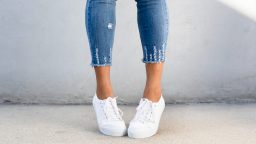As the fashion industry faces increasing pressure to reduce its environmental impact, many brands are stepping up to lead the charge towards more sustainable practices. From using eco-friendly materials to adopting ethical production processes, these brands are changing the fashion landscape and showing that style can be both fashionable and responsible. In 2025, eco-friendly fashion isn’t just a trend; it’s becoming a movement. Here are some innovative eco-friendly brands that are making a significant impact on the fashion industry.
- Patagonia: Pioneering Sustainable Fashion
Patagonia has long been a leader in the eco-friendly fashion movement. Known for its commitment to sustainability, the brand uses recycled materials for many of its products, including jackets made from recycled polyester and organic cotton for its T-shirts. Patagonia has also been a strong advocate for fair labour practices, ensuring that its workers are paid fairly and treated ethically. The brand’s „Worn Wear” program encourages customers to buy used gear and even trade in their old items for store credit, promoting a circular economy and reducing waste. Patagonia is a shining example of how a brand can combine sustainability with high performance and style.
- Stella McCartney: Luxury Meets Sustainability
Stella McCartney has been at the forefront of luxury fashion’s sustainability movement since its inception. The brand has always been vegan, ensuring that no leather or fur is used in its designs. McCartney’s dedication to eco-friendly fashion includes using organic cotton, sustainable wool, and recycled materials in her collections. Her commitment to sustainability also extends to the brand’s production processes, focusing on reducing waste and energy consumption. With a luxury brand like Stella McCartney leading the charge, it’s clear that sustainability can thrive in high-end fashion without compromising on style or elegance.
- Reformation: Sustainable, Chic, and Accessible
Reformation is an American fashion brand that has made sustainable and eco-friendly fashion accessible and chic. The brand uses sustainable fabrics like Tencel, organic cotton, and recycled materials, and it is committed to reducing its carbon footprint through eco-conscious manufacturing. Reformation’s trendy yet timeless designs appeal to a wide audience, proving that eco-friendly fashion doesn’t have to be frumpy or basic. The brand also focuses on transparency, sharing data on how each piece of clothing impacts the environment, which allows customers to make informed decisions about their purchases. Reformation’s blend of style and sustainability is revolutionising the fast-fashion industry.
- Everlane: Transparent and Ethical Fashion
Everlane is known for its commitment to transparency and ethical production practices. The brand focuses on providing high-quality, sustainable clothing while maintaining fair wages and working conditions for its employees. Everlane sources eco-friendly fabrics, such as organic cotton and recycled polyester, and is constantly striving to improve its environmental footprint. The brand also offers a range of items made from recycled materials, like its „ReNew” collection, which features outerwear made from 100% recycled polyester. Everlane’s commitment to transparency ensures that customers know exactly where their clothes come from and how they were made, empowering shoppers to make responsible purchasing choices.
- Allbirds: Footwear for the Planet
Allbirds has become a well-known name in sustainable footwear, and for good reason. The brand uses natural materials such as merino wool, eucalyptus tree fibres, and sugarcane to create comfortable and eco-friendly shoes. Allbirds’ commitment to reducing its carbon footprint is evident in its carbon-neutral operations, and the company continues to innovate with sustainable materials. The brand also encourages customers to recycle their old shoes, further supporting a circular economy. Allbirds has shown that it’s possible to create high-quality, stylish footwear that doesn’t harm the environment.
- Veja: Sustainable Sneakers With a Conscience
Veja is a French footwear brand that has garnered a loyal following for its stylish, eco-friendly sneakers. The brand uses organic cotton, wild rubber from the Amazon rainforest, and recycled plastic bottles in its designs. Veja’s commitment to transparency and ethical production processes sets it apart from many other sneaker brands. By working directly with small-scale farmers and ensuring fair wages for its workers, Veja is not only creating stylish sneakers but also supporting ethical trade and sustainable agriculture. With its minimalist designs and eco-conscious approach, Veja is helping to reshape the sneaker industry.
- Toms: Giving Back While Reducing Waste
Toms is best known for its iconic slip-on shoes, but the brand has also become a leader in the eco-friendly fashion movement. Toms has committed to using sustainable materials, including recycled cotton and plastic bottles, in its products. The brand is also focused on reducing its carbon footprint and supporting ethical production practices. In addition to its eco-friendly initiatives, Toms has long been dedicated to giving back. For every pair of shoes purchased, the company donates a pair to someone in need, making it a brand that prioritises both sustainability and social responsibility. Toms proves that fashion can make a positive impact on both the planet and communities.
- Pangaia: Revolutionary Materials for a Better Tomorrow
Pangaia is an innovative brand that combines cutting-edge science with sustainable fashion. The brand uses eco-friendly materials such as seaweed, recycled cotton, and bio-based fabrics to create its clothing. Pangaia’s focus is on using innovative materials to reduce the environmental impact of fashion while still creating stylish, comfortable garments. The brand also incorporates sustainable packaging and aims to reduce its carbon footprint with each collection. Pangaia’s focus on technology and sustainability makes it a game-changer in the industry, pushing the boundaries of what eco-friendly fashion can be.
- Girlfriend Collective: Size-Inclusive and Sustainable
Girlfriend Collective is a brand that blends sustainability with inclusivity. Specialising in activewear, the brand uses recycled materials such as post-consumer plastic bottles and fishing nets to create its stylish, size-inclusive clothing. Girlfriend Collective is committed to transparency, providing detailed information about the sourcing and production processes of its products. The brand’s commitment to reducing waste and its focus on creating eco-friendly activewear for all sizes has earned it a dedicated following. Girlfriend Collective is leading the charge in creating sustainable activewear that is both fashionable and functional for people of all shapes and sizes.
- The North Face: Sustainability Meets Adventure
The North Face has long been a go-to brand for outdoor clothing, and in recent years, it has embraced sustainability with open arms. The brand has launched several eco-friendly initiatives, including using recycled materials in its clothing and outerwear. The North Face also has a partnership with the „Renewed” program, which refurbishes used clothing to be sold again, encouraging the reuse of items that would otherwise end up in landfills. Through its commitment to reducing its environmental footprint and encouraging customers to buy second-hand gear, The North Face is helping to make sustainable fashion more accessible to the adventurous and eco-conscious.
Conclusion
The eco-friendly fashion movement is gaining momentum, and these brands are leading the way in creating sustainable, ethical, and stylish clothing. From using recycled materials and organic fabrics to prioritising ethical production practices and reducing waste, these companies are proving that fashion can be both chic and responsible. By supporting these eco-friendly brands, consumers can make a positive impact on the planet without sacrificing style. As the fashion industry continues to evolve, it’s clear that sustainability is not just a trend—it’s the future of fashion.





